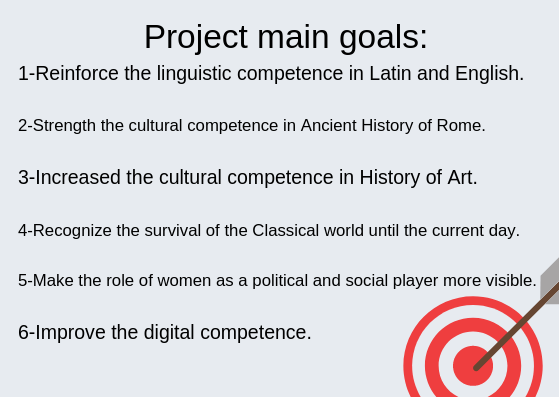The project "Interroga mulieres / Ask women" addresses the Ancient Roman history from the point of view of influential female characters through analyzing some Latin texts and artworks. The work has been carried out by Secondary and Baccalaureate students of Latin (aged 14-16) from Spain, Italy and Germany. English and Latin have been used as vehicular languages.
The project has been developed by using active methodology, collaborative work, CLIL (Contents and Language Integrated Learning), and ICT.
The worked issues are as follows:
-Five female characters linked to the founding of Rome, the early Republic, the end of the Roman Republic and the transit from Republic to Empire: Rhea Silvia, Hersilia, Tarpeia, Lucretia and Calpurnia.
-Rome's social and political structure and the role of women in Ancient Rome.
Some paintings related to the five female characters by Rubens, Jacques-Louis David, Lucas Cranach the Elder, Bartolomeo Pinelli and Abel de Pujol.
-The survival of the Classical world until the current day.

The project aims to improve the following general competences:
Each student has:
1-reinforced the linguistic competence in Latin (level A2) and English (level B1) by using not only the cultured language, but also the colloquial one.
2-strengthen the cultural competence in Ancient History of Rome approaching some mythological and historical female characters.
3-increased the cultural competence in History of Art, analyzing the historic content of some artworks from different periods.
4-recognized the survival of the Classical world until the current day.
5-enhanced the social and civic competences by making the role of women as a political and social player more visible.
6-improved the digital competence through the use of twinSpace and software tools: voki, padlet, blabberize, fake iphone, thinglink, genially, Google suite (Drive, site, gmail).
7-grown the learning to learn competence by working in international teams and cooperate with the students of the other schools.
8-developed the sense of initiative and entrepreneurship by learning to analyze, plan, organize and manage the tasks inside the international team.